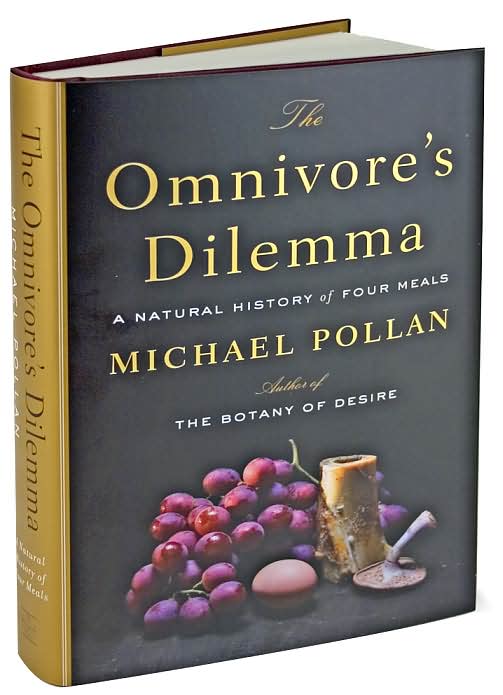
About: What should we have for dinner? The question has confronted us since man discovered fire, but according to Michael Pollan, the bestselling author of The Botany of Desire, how we answer it today, at the dawn of the twenty-first century, may well determine our very survival as a species. Should we eat a fast-food hamburger? Something organic? Or perhaps something we hunt, gather, or grow ourselves? The omnivore’s dilemma has returned with a vengeance, as the cornucopia of the modern American supermarket and fast-food outlet confronts us with a bewildering and treacherous food landscape. What’s at stake in our eating choices is not only our own and our children’s health, but the health of the environment that sustains life on earth.
In this groundbreaking book, one of America’s most fascinating, original, and elegant writers turns his own omnivorous mind to the seemingly straightforward question of what we should have for dinner. To find out, Pollan follows each of the food chains that sustain us—industrial food, organic or alternative food, and food we forage ourselves—from the source to a final meal, and in the process develops a definitive account of the American way of eating. His absorbing narrative takes us from Iowa cornfields to food-science laboratories, from feedlots and fast-food restaurants to organic farms and hunting grounds, always emphasizing our dynamic coevolutionary relationship with the handful of plant and animal species we depend on. Each time Pollan sits down to a meal, he deploys his unique blend of personal and investigative journalism to trace the origins of everything consumed, revealing what we unwittingly ingest and explaining how our taste for particular foods and flavors reflects our evolutionary inheritance.
The surprising answers Pollan offers to the simple question posed by this book have profound political, economic, psychological, and even moral implications for all of us. Beautifully written and thrillingly argued, The Omnivore’s Dilemma promises to change the way we think about the politics and pleasure of eating. For anyone who reads it, dinner will never again look, or taste, quite the same.
My thoughts: The Omnivore’s Dilemma was a fantastic read. Like all good journalists, Pollan ditches extraneous details and puts forth the facts in a straightforward manner. My favorite chapters discussed the deep flaws of the “organic industrial” complex. Prior to reading this book, I always equated the term “organic” with healthy and wholesome foods. I never considered the environmental implications, namely fossil fuel consumption i.e. dependence on foreign oil, with shipping organic foods across the land. It is not okay to ship produce from Chile to the States regardless of its organic certification. This sort of disregard for locality, seasonality, and sustainability characterizes the organic trend (see: Walmart). I will definitely think twice before buying “organic” produce and “free-range” meats from now on.
On the flip side, Pollan also examines the beauty of a “grass farm” where the animals are co-dependent on the land and to one another. Waste does not exist on this farm. The principles that run this operation go above and beyond the government’s organic standards and ideally should be replicated all over the United States.

I’m currently finishing this book. it’s a good read.